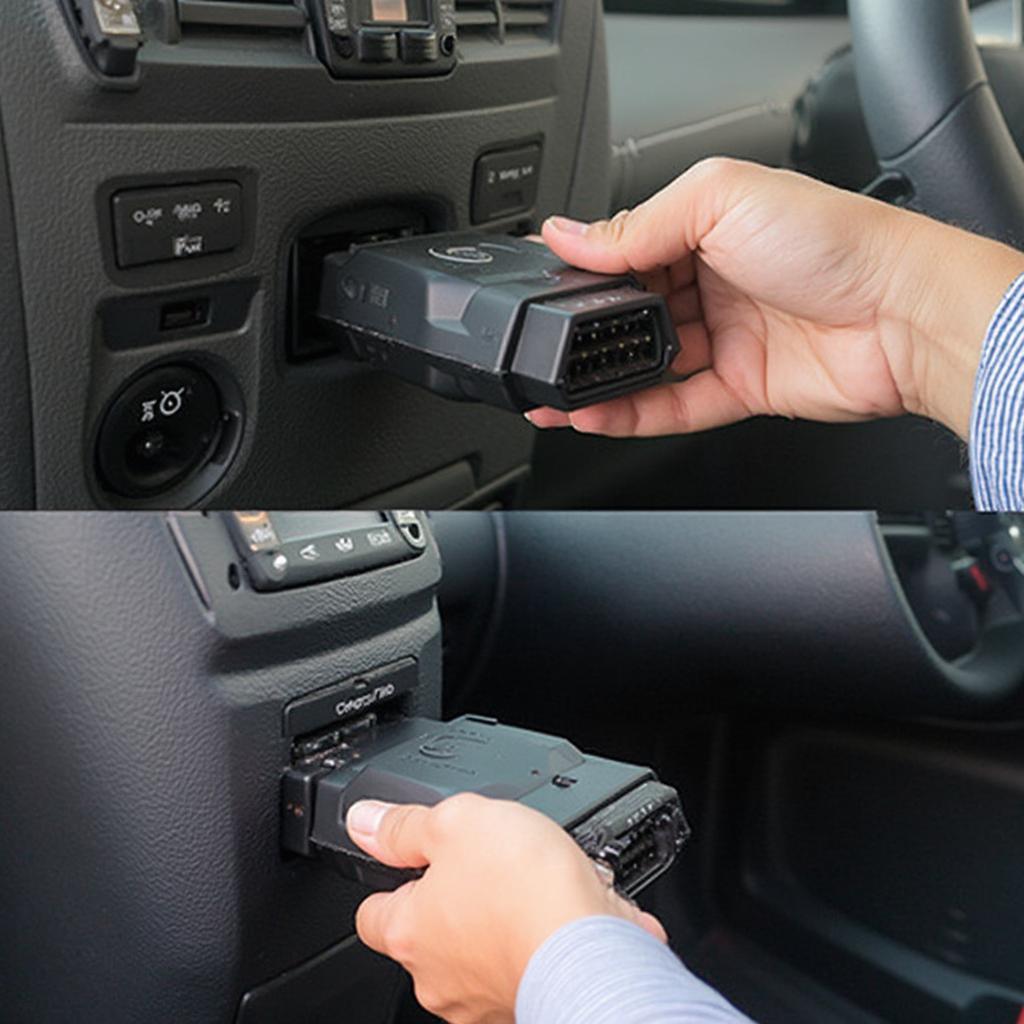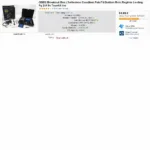An OBD2 scanner is a valuable tool for diagnosing car problems, but some users worry about it draining their car’s battery. This article explores the relationship between OBD2 scanners and battery drain, helping you understand the potential causes and providing effective solutions. We’ll delve into the reasons why leaving an OBD2 scanner plugged in might drain your battery and offer practical advice on how to prevent this issue.
If your car battery is draining after using an Kobra OBD2 Bluetooth Scanner, it might not be the scanner itself but another underlying issue. Let’s explore some common causes and solutions.
Does an OBD2 Scanner Drain Your Car Battery?
While OBD2 scanners themselves consume very little power, leaving them plugged in for extended periods, especially in older vehicles or those with existing electrical problems, can lead to a noticeable battery drain. This is often due to the scanner’s continued communication with the vehicle’s computer, even when the car is off. However, a properly functioning OBD2 scanner and car electrical system shouldn’t cause significant drain.
Common Causes of OBD2 Scanner Related Battery Drain
Several factors can contribute to battery drain when using an OBD2 scanner:
- Faulty OBD2 Scanner: A malfunctioning scanner could draw more power than intended, leading to a drain.
- Vehicle’s Electrical System Issues: Pre-existing electrical problems in your vehicle can be exacerbated by the added load of the scanner, making the drain more pronounced.
- Leaving the Scanner Plugged In: This is the most common culprit. Even though the scanner’s draw is minimal, it can still drain the battery over time, particularly in older cars.
- Parasitic Drain: The scanner might be highlighting an existing parasitic drain in your car’s electrical system, unrelated to the scanner itself.
How to Prevent OBD2 Scanner Battery Drain
There are several simple steps you can take to prevent your OBD2 scanner from draining your car battery:
- Unplug the Scanner: The easiest and most effective solution is to unplug the scanner when not in use. This eliminates any potential for drain.
- Use a Quality OBD2 Scanner: Investing in a reliable, high-quality scanner, like the ScanTool.net Bluetooth OBD2 Adapter, reduces the risk of a faulty scanner contributing to the drain.
- Check Your Vehicle’s Electrical System: If you suspect a problem with your car’s electrical system, have it checked by a qualified mechanic. Addressing underlying electrical issues can prevent further problems.
- Use a Battery Disconnect Switch: Installing a battery disconnect switch allows you to completely isolate the battery when the car is not in use, preventing any drain, including from the OBD2 port.
Addressing Existing Battery Drain Issues
If you’re already experiencing battery drain, you can troubleshoot the problem with a few steps:
- Check the OBD2 Port: Inspect the OBD2 port for any damage or debris that could be causing a short circuit.
- Test the Battery: Have your car battery tested to ensure it’s still holding a charge properly. A weak or failing battery is more susceptible to drain.
“A common misconception is that the OBD2 scanner is the sole culprit of battery drain,” says automotive expert Michael Johnson. “Often, the scanner simply exacerbates an existing electrical issue, making it more noticeable. A thorough check of the car’s electrical system is crucial.”
Can Leaving an OBD2 Scanner Plugged in Overnight Drain the Battery?
Yes, leaving an OBD2 scanner plugged in overnight could potentially drain your car’s battery, especially if you have an older car or a pre-existing electrical problem. It’s always best practice to unplug the scanner when not in use. Choosing the right scanner, like comparing Kobra OBD2 Bluetooth vs Wifi, can also be a factor.
“Think of your car’s electrical system like a plumbing system. A small leak might not be noticeable at first, but it can drain your reservoir over time,” explains automotive engineer Sarah Lee. “An OBD2 scanner left plugged in can act like that small leak, especially if there are other underlying electrical issues.”
Using a Mobile Hotspot with Your OBD2 Scanner: Will it Drain the Battery Faster?
Using a mobile hotspot, such as the AT&T Mobley Hotspot OBD2 Unlimited, in conjunction with your OBD2 scanner shouldn’t significantly increase battery drain. However, both devices draw power, so it’s essential to monitor your battery and unplug them when not in use.
 Unplugging OBD2 Scanner from Car
Unplugging OBD2 Scanner from Car
Conclusion
While an OBD2 scanner can contribute to battery drain, it’s often a symptom of a larger issue. By understanding the potential causes and implementing preventative measures, you can avoid this problem. Remember, unplugging your scanner when not in use is the easiest and most effective way to prevent battery drain.
FAQ
- How much power does an OBD2 scanner draw? Very little, but enough to drain a battery over time if left plugged in.
- Can a bad OBD2 scanner drain my battery? Yes, a faulty scanner can draw more power than it should.
- Will unplugging my OBD2 scanner fix my battery drain issue? It can, especially if the scanner was the primary cause of the drain.
- Should I disconnect my car battery if I’m not using it for a while? Yes, especially if you have concerns about parasitic drain.
- Can extreme temperatures affect battery drain with an OBD2 scanner? Yes, extreme temperatures can exacerbate battery drain issues.
- How can I test my car battery? You can use a multimeter or have it tested at an auto parts store.
- Is it safe to leave my OBD2 scanner plugged in while driving? Generally, yes, but it’s best to unplug it when not needed.
For further assistance, please contact us via WhatsApp: +1(641)206-8880, Email: [email protected], or visit our office at 789 Elm Street, San Francisco, CA 94102, USA. We have a 24/7 customer support team ready to assist you.
